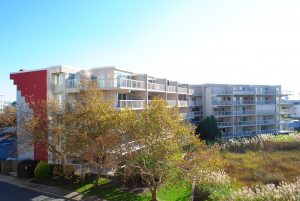
OCEAN CITY – The Worcester County Circuit Court has temporarily blocked actions on a lease agreement between an Ocean City condominium association and Verizon Wireless to install and operate cellphone antennas on the roof of a condo building.
The decision follows an ongoing civil case between Triton’s Trumpet Condominium Association and its subsequent Board of Directors and unit owners Lamont and Sandra McClure, whose condo sits directly below the proposed installation.
According to court documents, the McClures received an email notification from the association in August of last year regarding a proposal to install cellphone antennas and related equipment on the roof of Building C, which would earn the association revenue in excess of $325,000 over the course of a 10-year lease. An attachment contained a ballot, which all unit owners were encouraged to complete and return.
A written statement from Lamont McClure in court documents states that he sent a letter of opposition to the board with research on associated health risks and concerns over potential diminishing property values. After speaking at an Aug. 27 board meeting last summer, McClure said board members passed a motion to enter the lease agreement with Verizon Wireless, as a majority of respondents to the emailed ballot voted in favor of the installation.
The McClures then filed a request through their attorney in January to temporarily and permanently halt the pending installation.
“It’s given them grave concerns, not just about if the association can do this, but the health concerns as well,” their attorney Jonathan Wright said in an interview.
The complaint filed by the plaintiffs in this case state that actions and procedures the association took to enter and secure a lease with Verizon Wireless violated certain sections of the Maryland Condominium Act and association by-laws.
“In sum, the VzW (Verizon Wireless) installation and the lease agreement are not for residential purposes, not for providing a public utility to the owners of the condominium units, and not for the exclusive benefit of the units in the condominium,” the complaint reads.
More specifically, the complaint states that the association violated by-laws by failing to take votes at a meeting.
The defendants’ attorney declined to comment to this reporter on the case, but a motion was filed to dismiss the complaint.
According to court documents, the motion states that the board’s actions were authorized by the condominium and association’s governing documents and protected by the business judgment rule, which states that courts will not interfere with the business decisions of an organization that acts in good faith.
A written statement from board President Bev Andress in court documents said that a Nov. 7, 2015 meeting was scheduled to discuss the Verizon Wireless proposal, and two notices – one on Oct. 6 and another on Oct. 21 – were sent to condo owners with information regarding the meeting and voting process. Yet, a sign-in sheet from the day of the meeting does not show the plaintiffs as being present for the presentation and discussion. Afterwards, minutes from the meeting were emailed to Triton’s Trumpet condo owners and, after discussions between Triton’s Trumpet counsel and Verizon Wireless concluded, ballots were sent in August of 2016.
When 75 percent of the condo owners voted in favor of the installation, the motion said the board was authorized to enter into an agreement with Verizon Wireless. As of Dec. 29, 2016, 85 percent of condo owners agreed to the installation.
Court documents to dismiss the complaint state that the board had authority to enter into an agreement from the Maryland Condominium Act and the association’s by-laws on utilities and easements, a provision that the plaintiff allegedly failed to recognize.
“Plaintiffs fail to discuss this provision, which explicitly authorizes the board to enter into an agreement with Verizon Wireless for utility services,” the motion reads. “Verizon Wireless’ antenna project will not only financially benefit the community, but also provide an easement for utilities that benefits the community.”
Furthermore, the motion argues that the plaintiffs misstated the bylaws of the association that require votes to take place in a meeting.
“Nowhere under Article IV, Section 7 does it state that all votes must take place at meetings,” the motion reads, “only that votes that occur at meetings must take place in person or by proxy.”
Ultimately, the motion states that the defense’s decision to vote by ballot and enter into a lease with Verizon Wireless acted in the best interest of the condo owners.
In a hearing held earlier this month, the court granted a preliminary injunction until a final hearing is scheduled. As of Wednesday, a written order signed by the judge on the injunction was still forthcoming, according to Wright. The lease between Triton’s Trumpet and Verizon Wireless, however, has yet to come forth.
“What are the long-term impacts of this installation?” Wright asked. “We don’t know.”

